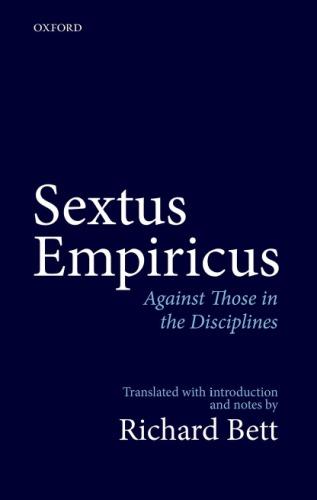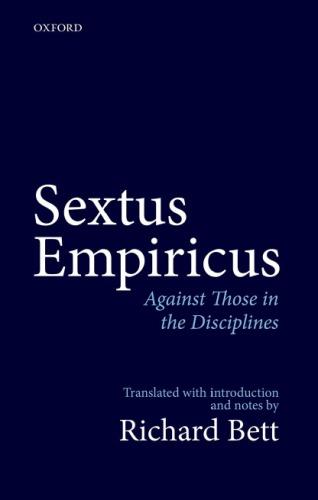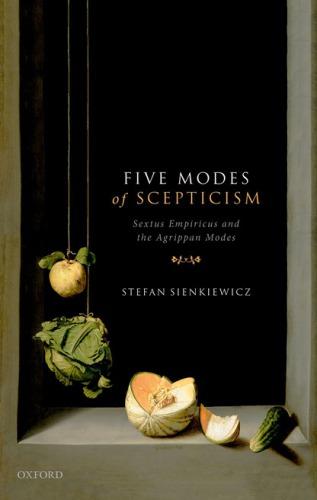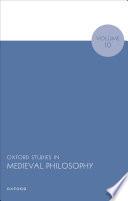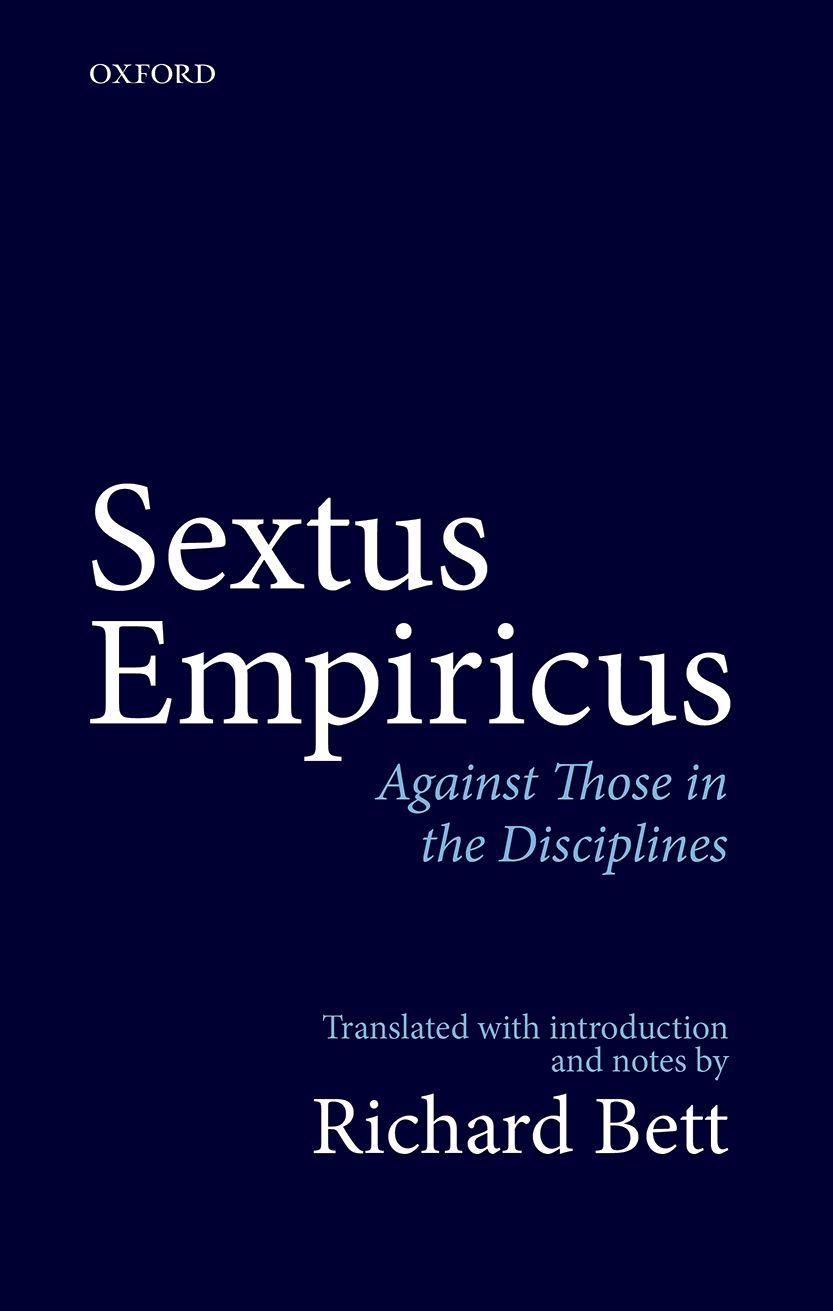SextusEmpiricus AgainstThoseintheDisciplines
Translatedwithintroductionandnotesby RichardBett
GreatClarendonStreet,Oxford,OX26DP, UnitedKingdom
OxfordUniversityPressisadepartmentoftheUniversityofOxford. ItfurtherstheUniversity’sobjectiveofexcellenceinresearch,scholarship, andeducationbypublishingworldwide.Oxfordisaregisteredtrademarkof OxfordUniversityPressintheUKandincertainothercountries
©RichardBett2018
Themoralrightsoftheauthorhavebeenasserted
FirstEditionpublishedin2018
Impression:1
Allrightsreserved.Nopartofthispublicationmaybereproduced,storedin aretrievalsystem,ortransmitted,inanyformorbyanymeans,withoutthe priorpermissioninwritingofOxfordUniversityPress,orasexpresslypermitted bylaw,bylicenceorundertermsagreedwiththeappropriatereprographics rightsorganization.Enquiriesconcerningreproductionoutsidethescopeofthe aboveshouldbesenttotheRightsDepartment,OxfordUniversityPress,atthe addressabove
Youmustnotcirculatethisworkinanyotherform andyoumustimposethissameconditiononanyacquirer
PublishedintheUnitedStatesofAmericabyOxfordUniversityPress 198MadisonAvenue,NewYork,NY10016,UnitedStatesofAmerica
BritishLibraryCataloguinginPublicationData
Dataavailable
LibraryofCongressControlNumber:2017964295
ISBN978–0–19–871270–1
Printedandboundby CPIGroup(UK)Ltd,Croydon,CR04YY
LinkstothirdpartywebsitesareprovidedbyOxfordingoodfaithand forinformationonly.Oxforddisclaimsanyresponsibilityforthematerials containedinanythirdpartywebsitereferencedinthiswork.
ListofAbbreviations
Note:proposalsforchangestotheGreektextthatareattributedinthe notestoscholarsbylastnamealone,wherethosenamesarenotincluded inthislist,arerecordedinMau’ s apparatuscriticus.Scholarlyworks citedbyauthoranddateareincludedintheBibliography.
BekkerSextusEmpiricus,exrecensioneImmanuelis
Bekkeri(Berlin:Reimer,1842)
BlankSextusEmpiricus, AgainsttheGrammarians, translatedwithanintroductionandcommentary byDavidBlank(Oxford:ClarendonPress,1998)
BurySextusEmpiricus, AgainsttheProfessors,withan EnglishtranslationbytheRev.R.G.Bury (Cambridge,MA:HarvardUniversityPress, 1949 vol.4ofcompleteLoebseriesofSextus)
CAGCommentariainAristotelemGraeca (Berlin: Reimer,1882–1909,multiplevolumes)
DavidsonGreavesSextusEmpiricus, AgainsttheMusicians:anew criticaltextandtranslationonfacingpages,with anintroduction,annotations,and indices verborum and nominumetrerum byDenise DavidsonGreaves(Lincoln,NE:Universityof NebraskaPress,1986)
Diels
DoxographiGraeci,collegit,recensuit, prolegomenisindicibusqueinstruxitHermannus Diels(Berlin:Reimer,1879)
DKH.DielsandW.Kranz, DieFragmenteder Vorsokratiker (Berlin:Weidmann,6thedition 1951)
Fabricius
SextiEmpiriciOperaGraeceetLatine: PyrrhoniaruminstitutionumlibriIIIcumHenrici Stephaniversioneetnotis,Contramathematicos
sivedisciplinarumprofessores,libriVI,Contra philosophoslibriV,cumversioneGentiani Herveti,Graecaexmss.codicibuscastigavit, versionesemendavitsupplevitqueettotioperi notasaddiditJohannisAlbertusFabricius(Leipzig: Kuehniana,revisededition1840–1 originally published1718)
HeintzWernerHeintz, StudienzuSextusEmpiricus (Halle:MaxNiemeyerVerlag,1932)
Helmreich ClaudiiGaleniPergameniScriptaMinora,vol.3, ed.GeorgHelmreich(Leipzig:Teubner,1893)
JürßSextusEmpiricus, GegendieWissenschaftler Buch 1–6,ausdemGriechischenübersetzt,eingeleitet undkommentiertvonFritzJürß(Würzburg: Königshausen&Neumann,2001)
Kassel-Austin PoetaeComiciGraeci,ed.R.KasselandC.Austin (Berlin/NewYork:deGruyter,1983)
Kock ComicorumAtticorumFragmenta,ed.Theodor Kock,3vols.(Leipzig:Teubner,1880–8)
Kühn GaleniOperaOmnia,20vols.(Leipzig,1819–33; reissued1965,Hildesheim)
LSA.A.LongandD.N.Sedley, TheHellenistic Philosophers ,2vols.(Cambridge:Cambridge UniversityPress,1987)
LSJLiddell–Scott–Jones, AGreek–EnglishLexicon (Oxford:ClarendonPress,1968andsubsequent printings revisedsupplement,1996)
M SextusEmpiricus, AdversusMathematicos (seeIntroduction,Section1)
Mau SextiEmpiriciOpera,vol.3(Leipzig:Teubner, 1961)
NauckAugustNauck, TragicorumGraecorum Fragmenta,2ndedition1889,reprintedwitha supplementbyBrunoSnell(Hildesheim:Georg OlmsVerlagsbuchhandlung,1964)
OCD
S.Hornblower,A.Spawforth,andE.Edinow (eds.), TheOxfordClassicalDictionary,4thedition (Oxford:OxfordUniversityPress,2012)
OEDTheCompactEditionoftheOxfordEnglish Dictionary (Oxford:OxfordUniversityPress, 1971)
Pellegrinetal.SextusEmpiricus, Contrelesprofesseurs: introduction,glossaireetindexparPierre Pellegrin,traductionparCatherineDalimier, DanielDelattre,JoëlleDelattre,etBrigittePérez, sousladirectiondePierrePellegrin(Paris: ÉditionsduSeuil,2002)
PfeifferCallimachus,ed.RudolfPfeiffer(Oxford: ClarendonPress,1949–53)
PH SextusEmpiricus, OutlinesofPyrrhonism (see Introduction,Section1)
SpinelliSestoEmpirico, Controgliastrologi,acuradi EmidioSpinelli(Naples:Bibliopolis,2000)
SVF H.vonArnim, StoicorumVeterumFragmenta, 3vols.(Leipzig:Teubner,1903–5)
TLGThesaurusLinguaeGraecae (searchableonline corpusofallancientGreektexts)
West²M.L.West, Iambietelegigraeci,2ndedition (Oxford:ClarendonPress,1989–92)
Introduction
1.Lifeandworks
SextusEmpiricusistheonlyancientGreekskepticwhocomposed writtenworkssomeofwhichhavesurvived.TheGreekword skeptikos literallymeans “inquirer”,andthatiswhatSextusandthoseinhistraditioncalledthemselves;anotherlabeltheyusedforthemselveswas “Pyrrhonist”,afterPyrrhoofElis,fromwhomtheyclaimedinspiration. Sextusstandsneartheendofthistradition,whichlastedintermittentlyfor severalcenturies;wehearofapupilofhisnamedSaturninus(Diogenes Laertius9.116),butafterthattherearenoidentifiablePyrrhonistsin antiquity.Heisgenerallyplacedinthesecondcentury CE,butthecomplete lackofreferencetohiminGalen(129–216 CE)suggestsaslightlylater floruit,perhapsintheearlythirdcentury.Thisisbecausehewasadoctor thatistheonlyreallysolidpieceofautobiographicalinformationhe givesus(PH 2.238, M 1.260, M 11.47) and,tojudgefromhistitle,a memberoftheEmpiricschoolofmedicine(aswereotherPyrrhonists); DiogenesLaertiusalsocallshim “SextustheEmpiricist” (9.116),andthe pseudo-Galenic IntroductionorDoctor actuallyreferstohimasaheadof theschool(KühnXIV,683–4).Thematteriscomplicatedbythefactthatin theoneplaceinhissurvivingworkswhereheactuallydiscussesmedical Empiricism(PH 1.236–41),Sextusseemstodistancehimselffromitandto claimacloseraffinitytoskepticismforanotherschoolofmedicine,the Methodicschool.Butwhatevertheresolutionofthatissue,¹Sextuswas clearlyinvolvednotjustinmedicalpractice,butindebatesaboutmedicine; ¹ThequestioniswelltreatedinAllen2010.OnepossibilityisthatSextusdoesnotmean torepudiateEmpiricismasawhole,butonlyonevarietyofEmpiricism.Butwhilethetext admitsofthisreading,thatstillleavesthepreferenceforMethodism(ratherthanan another,favoredvarietyofEmpiricism)tobeaccountedfor.
besidesthepassagejustmentioned,herefersto(nowlost)worksofhis called MedicalTreatises (M 7.202)and EmpiricalTreatises (M 1.61).²Galen wroteaboutbothEmpiricismandMethodism,³hadvoluminousknowledgeofthemedicaldiscussionsofhistime,andwasnotshyaboutnaming thosewhoseideashewasconsidering;forhimtohavehadnothingtosay aboutSextuswouldbeverysurprising unlessSextuspostdatedhim.
Beyondthis(whichisalreadymoredefinitethanmanyscholarswould becomfortablewith),wereallyknownothingaboutSextustheman.⁴ Thereareveryfewreferencestohimbynameinantiquity,andveryfew indicationsofhisworksbeingread.Anothercuriouspointisthatthese worksseemtoshownoawarenessofthephilosophyofSextus’ ownday. EvenifonediscountsGalen’ssilence,Sextusrefersinthepasttensetothe emperorTiberius(PH 1.84),whichputshimnoearlierthanthemiddle ofthe firstcentury CE;andyethisknowledgeofthehistoryofphilosophy, tojudgefromthosehenames,seemstoendintheearly firstcentury BCE.⁵ TherevivedPlatonismandAristotelianismthatdominatedlateantiquity wereunderwayinSextus’ lifetime(wheneverpreciselythatwas),butone getsnohintofthisfromhisworks.Thisisjustoneofmanyquestions aboutSextusthatarelikelytoremainunanswered.⁶ Inanycase,hisown
²Thesemayormaynotbedistinct;theymaybethesameworkunderalternativetitles, orthelattermaybeapartoftheformer.
³AgoodintroductionisFrede1985.
⁴ House1980detailsourcomprehensiveignorance,andisalsomuchmorenoncommittalaboutSextus’ dates.Onthelatter,IhavebeeninfluencedbyJouanna2009; althoughtheargumentfromGalen’ssilenceisnotnew,andalthoughargumentsfrom silenceareneverconclusive,Jouannamakesastrongcaseforhowunlikelyitwouldbefor GalennottorefertoSextusiftheywerecontemporaries.Healsosetsa terminusantequem bythedatesofHippolytus(c.170–c.236 CE),whose RefutationofallHeresies includestext thatisveryclosetoaconsiderableamountofSextus’ AgainsttheAstrologers (M 5)andhas generallybeenthoughttobecopiedfromitwithinsignificantchanges.Butthisismore questionable;HippolytusandSextuscouldeachbedrawingonsomenowlostcommon source.ThishasbeenarguedforinparticularbyJanáček1959,1964(althoughJanáček’ s casedependsonahighlydisputableviewofSextus’ stylisticdevelopment;seen.13).
⁵ TheStoicBasilidesisapossibleexception(see M 8.258);aStoicofthisnameisattested asateacherofMarcusAurelius.ButwealsohavealistofStoics,seeminglyorderedby chronology,inwhichaStoicBasilidesshowsupinagroupfromthesecondcentury BCE (see Rose1866,370–1).Sextuscouldbereferringtoeitherone.
⁶ Sedley2003showsthatSextuswasbynomeansaloneintreatingphilosophyas extendingnolaterthantheearly firstcentury BCE,andpositsamajortransformationof philosophy,inthemid-firstcentury BCE,towardsaprojectof “recoveringandunderstandingthewisdomoftheancients” (36) ratherthanoneselfcontributingnewwisdom,asit hadbeenpreviouslyconceived.Sedley’scaseispowerfulandintriguing,butIdonotthinkit fullyaccountsforthecaseofSextus.ForSextusclearlydoes not thinkofhimselfas
obscuritywasnotpermanent.Sincetherevivalofinterestinantiquityin theRenaissance,hisworkshaveattractedmuchmoreattention;topick outjusttwopointsinwhatcouldbealonghistoryofhisreception,there wereLatintranslationsofallofthembythe1560s,⁷ andthereisconsiderableinterestinthemamongcontemporaryepistemologists.
Oftheseworks,theonepresentedinthisvolumeisundoubtedlythe leastwellknown,atanyrateamongphilosophers.Thereasonforthisis nodoubtbecauseitssubjectmatterisnotdirectlyphilosophical.Sextus’ best-knownwork, OutlinesofPyrrhonism (abbreviatedas PH,thetransliteratedinitialsoftheGreektitle),consistsofonebookexpoundingthe skepticaloutlookingeneralterms,andtwobooksexaminingthetheories ofnon-skepticsinthethreetraditionaldivisionsofphilosophy:logic, physics,andethics.Anotherwork,consistingoftwobooks Againstthe Logicians ,two AgainstthePhysicists,andone AgainsttheEthicists,does thesecondofthesethingsatmuchgreaterlength,butwasalsoalmost certainlyprecededbyalostbookorbooksofgeneralexposition,parallelingthe firstbookof PH. ⁸ Incontrasttoboththeseworks, AgainstThose intheDisciplines consistsofsixbooks,eachdealingwithadifferent specializednon-philosophical field:grammar,rhetoric,geometry,arithmetic,astrology,andmusic.Asonemightexpect,Sextusfrequentlyrefers totheoriesandideasinthese fieldsinthecourseofhistreatment;thelevel oftechnicalityvariesfromonebooktoanother,the firstandbyfarthe longestbook, AgainsttheGrammarians,beingthemostchallenginginthis respect.Oneofthefunctionsofmynotestothetranslationistoaidthe readerincomprehendingthedetailsofthesubjectsunderdiscussion. recoveringancientwisdom;whilehetalksalotaboutearlierphilosophies,thisisalwaysin theserviceofhisownpresentbrandofPyrrhonism.Indeed,whenitcomestodocumenting therelationsbetweenearlierphilosophers(evenearlierPyrrhonists)andhisownthought, heseemstogooutofhiswaytodistancethemallfromhimself;thismayevenbeareaction againstthetendencyinhisdaytoappealtofounding figuresfromthepast(onthis,seeBett 2015a).Ifso,ofcourse,hedoeshaveatleastageneralawarenessofthecontemporary philosophical zeitgeist.However,sinceoneofhisgoalsisclearlytopromoteandpublicize Pyrrhonism,hislackofdirectengagementwiththealternativephilosophiesofhiscontemporariesisstillverysurprising.
⁷ SeeFloridi2010.
⁸ The firstsentenceof AgainsttheLogicians (M 7.1)refersbacktojustsuchageneral exposition.Thiswaslongthoughttobeaback-referenceto PH.But PH asawholeisnota generalexposition onlyits firstbookis;thereferencemustthereforebetoageneral expositionoriginallypreceding AgainsttheLogicians aspartofthesamework.Thiswas establishedbyJanáček1963.
However,onedoesnotneedtobeanexpertinthese fieldsinorder toappreciatethathere,asinhismorestraightforwardlyphilosophical works,Sextusisespousingaskepticaloutlookofconsiderableinterest.
TheGreektitleofthiswork, Prosmathêmatikous ,oritsLatinized equivalent Adversusmathematicos (standardlyabbreviatedas M or,to indicateitssixbooks,⁹ M 1–6),hassometimesbeenrendered Againstthe Professors .Butthetitle “professor” hasnoexactequivalentintheancient worldandmayhavemisleadingassociations.InthepastIhaveused AgainsttheLearned,appealingtothebasicmeaning(“learn”)oftheroot math-.ButInowpreferatranslationpickinguponthewordthatisthe immediatebasisof mathêmatikos:theword mathêma, “discipline” or “fieldofstudy” (literally, “thinglearned”),whichismuchappealedto intheintroductiontothewholework(M 1.1–8).Sextusemphasizeshere thatitisthesedisciplines,andtheirpractitionersthe mathêmatikoi, thatheisgoingtobedealingwith;¹ ⁰ itseemsappropriateforthetitleto re flectthat.
TheorderofcompositionofSextus’ workshasbeenatopicofconsiderabledebate,mostlycenteringaroundthequestionwhether PH was writtenbeforeorafterthelongerworkthatcoversbroadlythesame ground.¹¹Concerning M 1–6,itclearlycomesafterthelongerofthose twoworks;itcontainsspeci ficbackreferencesto AgainstthePhysicists (M 1.35,3.116),andalsoreferencestoidentifiablepassagesofthiswork underwhatispresumablySextus ’ titleforthewholework: Skeptika Hupomnêmata, SkepticalTreatises (M 1.26,29,6.52).¹²Sinceanumber ofpassagesin M 1–6havecloseparallelsinthiswork,itmaybeof interesttobearinmindwhichcame first.Therelationbetween M 1–6 and PH ismuchlessclear;therearenoexplicitreferencesto PH in M 1–6
⁹ Alsotodistinguishitfrom AgainsttheLogicians, Physicists,and Ethicists;seen.12.
¹
⁰ Mathêma cansometimesrefertomathematicaldisciplinesinparticular,andweshall seeafewcases,inthecontextofthemathematicalbooks(3and4),wherethisisprobably whatSextusmeansbytheterm.Butthemoregeneralsenseistheusualoneinthiswork.
¹¹IhavediscussedthisquestionintheintroductionstoBett1997,Bett2005,andBett 2012.
¹²Perhapsbecauseofthelossoftheopeninggeneralbookorbooks,thesurvivingbooks of SkepticalTreatises cametoberegardedasacontinuationof M 1–6;hence Againstthe Logicians isstandardlyabbreviatedas M 7–8, AgainstthePhysicists as M 9–10,and Against theEthicists as M 11.Althoughthismakesnosenseatall,since M 1–6isacompleteand self-containedworkonaquitedistinctsubject,thisstandardnomenclatureisentrenched andIshalladheretoitforpurposesofreference.
INTRODUCTION
orviceversa.¹³Therearesomepassageswherethesametopicsaretreated inbothworks,butwiththepossibleexceptionofsomegeneralarguments againstteachingandlearning versionsofwhichappearinallthree works(M 1.9–40, M 11.216–57, PH 3.252–72) theparallelsbetween M 1–6and PH arelessclosethanbetween M 1–6andthelongerwork. Nevertheless, PH,beingtheonlyoneofSextus’ threesurvivingworks¹⁴ to containageneralaccountoftheskepticaloutlook,isimportantforour understandingofwhathisbrandofPyrrhonistskepticismis.Iturntothis matternext,beforefocusingonanumberofkeyfeaturesof M 1–6itself.
2.Sextus’ Pyrrhonistskepticism
Pyrrhonistskepticismisnottheonlyvarietyofskepticisminancient GreekandRomanphilosophy.TheAcademy,theschoolfoundedby Plato,wasformostoftheHellenisticperioddominatedbyaskeptical outlook;thoughtheseAcademicsdidnotcallthemselvesskeptics the termitselfseemstooriginatewiththePyrrhonists theirattitudeswere alreadyrecognizedinantiquityashavingmuchincommonwith Pyrrhonism.TherelationsbetweenAcademicandPyrrhonistskepticism arecomplicatedand,sinceSextusdiscussestheAcademicsnotinfrequently,cansometimesbeimportantforunderstandingwhatheissaying. However,in M 1–6theAcademicsmakeonlyoneappearance Sextus appealstotheirviewsontheuselessnessofrhetoric(M 2.20–43) and theyneednotbefurtherconsideredhere.
Asnotedearlier,thePyrrhonisttraditionstartswithPyrrhoofElis (c.360–c.270 BCE).Pyrrhowrotenothing,buthisideasandlifestylewere recordedbyhisdiscipleTimonofPhlius(c.320–c.230 BCE)andperhaps
¹³ PH hasgenerallybeenregardedastheearliestofthethreeworks.Butthisviewaroseas aresultofamistake;cf.n.8.KarelJanáček,havingexposedthemistake(seeJanáček1963), nonethelesscontinuedtoargueonstylisticgroundsthat PH waswritten first;seeJanáček 1972andJanáček2008(aposthumouscompilationofhissmalleressaysonSextusand skepticism).Thesestudiesareimportantinestablishingstylisticdifferencesamongthe works differencesofakindthatdoindeedpointtotheirhavingbeencomposedat differenttimes(onthispoint,seeBett2015b,35).Butthatdoesnottellustheorderof theworks,andJanáček’schronologicalsuppositionsareahouseofcards;seeBett1997, AppendixC.InthecommentaryonchapterVII(withAppendixA)ofthesamework, Iarguedonthebasisofparallelpassagesthat PH isthelatestofthethreeworks,butthecase isnotconclusive.
¹⁴ Besidesthelostmedicalworksreferredtoearlier,Sextusalsoreferstoanowlostwork ofhis OntheSoul (M 6.55, M 10.284).
others.Timon ’swritingshavesurvivedonlyinfragments,andthe reconstructionofPyrrho’sthoughtis,tosaytheleast,difficultand controversial.¹⁵ In M 1–6SextusrefersafewtimestobothPyrrhoand Timon(M 1.53,281–2,305–6,3.2,6.66),generallysignalinghisagreementwiththeirapproachtosometopic;butneitherherenorelsewhere doeshetellusinanydetailwhattheysaidorthought.Fromhisperspective,indeed,theyareprobablyratherremote figureshavingnodeep connectionwithhisownskepticalpractice.Thehistoricallinkitselfis somewhattenuous.Afteragenerationorsoofimmediatefollowers, interestinPyrrhoseemstohavelapseduntil,intheearly firstcentury BCE,hewasadoptedasa figureheadforanewskepticalmovementby AenesidemusofCnossos,himselfaformermemberoftheAcademy.Our informationonAenesidemusisalsoscanty(thoughweknowthat,unlike Pyrrho,hedidwritebooks);¹⁶ butthereisnoclearevidencethatAenesidemus’ choicetocallhimselfandhiscolleagues “followersofPyrrho” (hoiapoPurrônos)wasbasedondetailedconsiderationofPyrrho’ s thought,ratherthanageneralsenseofcommonattitudesanddemeanor. Inanycase,themovementstartedbyAenesidemusisthePyrrhonismto whichSextuslaterbelonged.Wehavenootherwritingsfromitbesides thoseofSextus beyondourverylimitedevidenceonAenesidemus, virtuallyallweknowaboutthisPyrrhonismpriortoSextusarethe namesofafewotheradherents.
Assuggestedearlier,Sextus’ versionofPyrrhonismisbestapproached bywayofthe firstbookof PH.EarlyinthisbookSextusoffersand explainsthefollowingone-sentencedescriptionofwhatskepticismis: “Theskepticalabilityisonethatproducesoppositionsamongthingsthat appearandthingsthatarethoughtinanywaywhatsoever,onefrom which,becauseoftheequalstrengthintheopposingobjectsand accounts,wecome firsttosuspensionofjudgement,andafterthatto tranquility” (PH 1.8).Athree-stageprocedureissketchedhere.Inthe firststage,onecollectsimpressions(“thingsthatappear”,whichmay refertosensoryimpressionsormoregenerallytoanywayinwhich thingsstrikeoneunreflectively)andopinionsorarguments(“things thatarethought”)onanygivenquestion.Theseimpressions,opinions,
¹⁵ Forabriefaccountoftheissues,seeBett2014a.
¹⁶ OuraccesstothisevidencehasbeengreatlyimprovedbyPolito2014.
andargumentsexhibitoppositionsamongoneanother;theremaybe contradictoryimpressionsofthesamething,orcontradictoryarguments aboutit,oranunreflectiveimpressionmaybecontradictedbyanargumentonthesamesubject thismultiplicityistheforceof “inanyway whatsoever”.Now,facedwithsuchoppositionsamongtheimpressions, opinions,andargumentsonanygivenquestion,whatisonetodo?One mighttrytodecideamongthemandsodiscoverthetruthaboutthe matter.ButaccordingtoSextus,thiswillnotsucceed.Thisisbecausethe opposingperspectivesexhibitthefeatureof “equalstrength” (isostheneia). Thatis,onehasnogreaterinclinationtooptforanyoneofthemthan foranyother;eachonestrikesoneashavingequalweight.Inthis situation,theonlypossibleresultisthatonesuspendsjudgement;thisis thesecondstage.
Thethirdstage,tranquility,canwaitforamoment;severalquestions needtobeaddressedaboutthestorysofar.First,howarewetounderstand thisnotionof “equalstrength”?Isitthatonejudgestheopposingpositions tobeofequalrationalmerit,andonesuspendsjudgementbecauseone drawstheconclusionthatoneoughtrationallytodoso?Orisitapurely psychologicalprocess,whereonesimply findsoneselfequallyinclinedor disinclinedtowardseitherside(oreveryside)ofthecase,andgiventhat situation, findsoneselfdecliningtoassenttoanyofthealternatives?Both interpretationshavetheiradherents.¹⁷ Adifficultyforthe first,rational interpretationisthatthestandardsofrationalityappealedtowouldseem themselvestobefodderfortheskeptic’ s “ability” atassemblingoppositions.Ontheotherhand,Sextusdoestalkofthe necessity ofsuspending judgement,andthisisattimeshardnottoreadasreferringtorational necessity,anecessityimposedbythemeritofthearguments.Thisis particularlytruewhenitcomestothegroupsofstandardizedarguments knownastheModes(PH 1.35–179).¹⁸
Second,whicheverreadingof “equalstrength” weadopt,whyisSextus sosurethat “equalstrength” willinfactbeproducedoneverytopic?The answer,Itakeit,hastodowiththeskeptic’ s “ability” (dunamis):theskeptic
¹⁷ Forthe first,rationalinterpretationseePerin2010,chapter2;Vogt2012,chapter5.3. Forthesecond,psychologicalinterpretationseeWilliams2010.
¹⁸ SeeBett2011a.HereIillustratewhytheModesarehardto fitwiththepsychological interpretation,whilealsoexpressingageneralpreferenceforthatinterpretation.
issomeonewhois verygood ataccumulatingopposingperspectivesin suchawaythattheyexhibitsuch “equalstrength”.Ofcourse,asetof oppositionsthatoneaudience findsof “equalstrength”,anotheraudience maynot;henceitseemsthattheprocedurewillneedtobesensitiveto whomoneistalkingto,andSextusconfirmsthispoint(PH 3.280–1).
Anaturalworryisthatthereisliabletobealargemeasureofcontrivance ormanipulationinthisprocess;theskepticissetongeneratingacertain typeofattitude,regardlessoftheactualmeritsoftheissueunderdiscussion.Buttheskeptic’sresponsewouldnodoubtbetochallengethenorms ofrationality,logicalvalidity,etc.onwhichthisworrydepends.
Third,Ihavesaidthattheprocedurecanbeapplied “onanygiven question”,butwhatisthescopeofthis?Onethingthatisclearisthat Pyrrhonistskepticismisnotastancespecificallywithinepistemology,as aremostformsofskepticismincontemporaryphilosophy.Onecan,of course,applytheproceduretoquestionsconcerningthenatureand extentofourknowledge,andattimesSextusdoesso(intheancient taxonomywhatwecallepistemologyfallsunderlogic).Butthereisno inherentlimitationtothisortoanyotherparticularsubjectmatter,and thesubjectsconsideredin M 1–6areagoodexampleofthis.Amore controversialmatteris,asonemightputit,thelevelatwhichthese questionsaretobeaddressed.DoesPyrrhonistskepticismapplyonlyto theintellectualposturesofphilosophersorothertheorists,oralsotothe non-theoreticalbeliefsofordinarypeople?Sextussometimessuggests thatheisasupporterofeverydayattitudesorpracticesasagainstthe abstractionsoftheorists,and,asweshallsee, M 1–6includesseveral examplesofthistendency.Butsometimesordinarypeople’sviewsthemselves figureamongtheitemsplacedinopposition.ItmaybethatSextus vacillatesonthisquestion.
Finally,Sextus ’ characterizationofskepticismasan ability points toanotherimportantcontrastwiththewayskepticismisunderstood inphilosophytoday.Pyrrhonistskepticismisnotatheoryoraconclusionbut,asIhavecalleditseveraltimes,aprocessoraprocedure.The Pyrrhonistskepticdoesnotassertordenysomesetofpropositions,but does something namely,bringsaboutsuspensionofjudgement.And this,incidentally,isanactivitythathastobekeptup;whereasonemight developsometheoryorreachsomeconclusionandbedonewiththe matter,suspensionofjudgementneedstobemaintainedovertime(in oneselforinothers)byever-renewedexerciseofthe “ability” .
Theeffectofthisactivity,asSextusconcludesbysaying,istranquility (ataraxia).Morespecifically,ashetellsuselsewhere(PH 1.25–30, M 11.141–4),heistalkingabouttranquilityinmattersofopinion.All ofus,skepticsincluded,sufferhunger,thirst,pain,etc.(althoughskeptics,itturnsout,arebetteroffthanothersevenhere thereasonswould takeustoofarafield).Buttheholdingofopinionscanalsobeasourceof disturbance,andsuspensionofjudgement whichis,precisely,the withdrawalfromopinions canthereforereleaseonefromdisturbance. Asforwhythisshouldbe,Sextusseemstotelltwosomewhatdifferent stories.Hisinitialmentionof ataraxia suggeststhatsuspensionof judgementquitegenerallybringstranquility,andthefollowingsections shedalittlemorelightonthis.Hetellsusthattheskepticissomeone whoinitiallytriestodiscoverthetruth,thinkingtoattain ataraxia in thatway(PH 1.26,28–9,cf.12).Butthisdoesnothappen;beingfaced withthe “equalstrength” oftheopposingconsiderations,heisforcedto suspendjudgementinstead.However,itturnsoutthatthissuspension ofjudgementproducestheverytranquilityhewasseekinginthe first place.¹⁹ Itsounds,then,asifwantingtodiscoverthetruthbutbeing unsureaboutitisupsetting;oneinitiallytriestoachievetranquility throughdiscovery,butoneactuallyachievesitbysuspendingjudgementandthusgivingupontheworrisomeandunsuccessfulsearch. Andallthisappliesregardlessofthesubjectmatter.Ontheotherhand, wheneverSextusexplicitlyaddressesthequestionwhysuspensionof judgementyieldstranquility,hisansweralwaysconcernsbeliefsabout onespecifi csubjectmatter:whetherornotcertainthingsarebynature goodandothersbynaturebad.Beliefstotheeffectthattherearesuch things,heclaims,makeonecarefartoomuchaboutgettingthegood andavoidingthebad(PH 1.27–8,30,3.235–8, M 11.110–67).The skeptic,bycontrast,istranquilbecauseofnothavingthesebeliefs; ifonedoesnotholdthatanythingisgoodorbadbynature,thestakes arejustmuchlower.Itmaybepossibletoreconcilethesetwostories, butonemightwishSextushaddonemoretoexplainhowtheyrelate
¹⁹ Ofcourse,afurtheraccountwouldbeneededofhowthisinitialattainmentof tranquilitythroughsuspensionofjudgementistransformedintotheskeptic ’ ssettled “ ability ” togeneratesuspensionofjudgement(andtherebytranquility).Sextusdoes notsupplythis,butIthinkitisnottoohardtoimagineanaccountthatwould fi ll thegap.
tooneanother.² ⁰ Inanycase,suspensionofjudgementissupposedto improveone ’slife,sothattheskepticisbetteroffthanthenon-skeptical philosopher or “dogmatist ”,touseSextus’ language andperhaps alsothanordinarypeople,sincetheytooaresaidtoholdthatcertain thingsarebynaturegoodorbad(PH 1.30).
Soskepticismisnotathreattobewardedoff,asitistypicallyviewed incontemporaryphilosophy;onthecontrary,itistobeembracedas freeingonefromworry.Norareitsbenefitsconfinedtothepurely intellectualrealm;skepticismisawayoflife,whosebene fitsarequite practical.Wemayormaynot findallofthisbelievable,butthisisthe pictureSextusoffersus.
Now,Ihavereliedon PH 1forthisexpositionofSextus’ skepticism becauseitisbyfarthefullestandmostexplicitsurvivingtextinwhich heexplainshisoutlook.Buthisonereallyclearprogrammaticremarkin theintroductorysectionof M 1–6seemspreciselyinlinewiththeideas wehavejustbeenconsidering.Sextussaysthat “thesamesortofthing happenedto[thePyrrhonists]inthecaseofthedisciplinesasitdidinthe caseofphilosophyasawhole.Forjustastheywentafteritwithalonging toattainthetruth,butafterencounteringconflictofequalstrengthand lackofuniformityintheobjectstheysuspendedjudgement,sotoointhe caseofthedisciplinestheysetouttopickthemup,heretooseekingto learnthetruth,butondiscoveringequalimpassestheydidnotconceal them” (M 1.6).Thefocusisontheinitialsearchforthetruthandits outcomeinsuspensionofjudgement,ratherthantheongoingprojectof generatingsuspensionofjudgementtowhichthatleads.ButSextusis verydeliberatelytellingusthathisprocedurehereisthesameashisusual one,andhisdescriptionofthatprocedureisentirelyrecognizablefrom theaccountwehavelookedatin PH.Infact,someofthelanguageis virtuallyidenticalinbothworks: “lackofuniformityintheobjects” occursinbothtexts(anômaliaitônpragmatôn, M 1.6; tênentois pragmasianômalian, PH 1.12),and “ conflictofequalstrength ” (isostheneimachêi, M 1.6)echoes “disputeofequalstrength” intheotherwork (isosthenêdiaphônian, PH 1.26).ThusSextus’ previewattheopeningof M 1–6seemsclear:heisgoingtocreateoppositionsamongtheoriesand
²⁰ IhavediscussedthismatterinBett2010(esp.189–90)andBett2011b(esp.7–9).Itis notablethatinonepassage, PH 1.25–30,heseemstoswitchfreelybetweenthetwo,asif therewasnodifferencebetweenthem.
contentionsinthedisciplines,oppositionsthat,becauseoftheir “equal strength”,willresultinsuspensionofjudgement justashedoesinthe morestrictlyphilosophicalsubjectsthatareaddressedin PH.Thereisno mentionhereof ataraxia,butthatisnosurprise;ingeneralSextus confineshisdiscussionsof ataraxia tohisbasicexpositionofPyrrhonism in PH 1andhiswritingsonethics.Thefocushere,asitisthroughout Sextus’ works,isongeneratingsuspensionofjudgement,and ataraxia, itsby-product,doesnotneedtobementioned.
3.Negativedogmatism?
Soeverythinglooksinorder.Butthereisacomplication.Once M 1–6 getsunderway,itoftendoesnotlookasifSextusisdoingwhathesaidhe wasgoingtodo.Torepeat,Sextus’ self-descriptionhasthePyrrhonist skepticsuspendingjudgement,notarguingfordefiniteconclusions evennegativeones.Thusargumentstotheeffectthatnothinginacertain domaincanbeknown,orthatacertainitemdoesnotexist,orthata certainactivityisuseless,donotcountasskepticismaccordingtothe Pyrrhonist;instead,theyarejustanotherformofdogmatism—“negative dogmatism”,asmodernscholarshiphascalledit.(Weseehereanother contrastwithskepticismasdiscussedinmodernphilosophy,where “theskeptic” isusuallysomeonewhomakesnegativeknowledgeor existenceclaims.)AndyetnegativedogmatismispreciselywhatSextus seemstobeengaginginatmanypointsin M 1–6.
Thevery firstphraseofthewholework—“thecounter-argument againstthoseinthedisciplines”—alreadybringsthematterintofocus. SextussaysthattheEpicureansandthePyrrhonistsbothmadesuch “counter-arguments”,thoughofdifferentkinds(M 1.1).Butalthoughhe criticizestheEpicureansforbeingdogmaticincriticizingthedisciplines fortheiruselessness(M 1.5),andthisisrepeatedinalaterbook(M 6.4), hedoesnotbackawayfromtheideathatthePyrrhonistisinthebusiness ofissuingcounter-arguments.Evenafterhavingspokenoftheskeptical enterpriseofsuspensionofjudgement,inthepassageweconsideredat theendofSection2,heimmediatelyrevertstorepeatedtalkofassemblingarguments against thedisciplines,andtheintroductorysectionends, asitbegan,withtheword “counter-argument” (antirrêsin, M 1.7–8).And thisreallysetsthetoneformuchofthework.Forexample,inthemiddle booksongeometryandarithmetic,Sextusarguesthatlines,points,
circles,etc. thebasicentitiesofgeometry donotexist( M 3.92),and thatthereisnosuchthingasnumber,thestartingpointofarithmetic (M 4.34).Inthe fi nalbook,too,musicisarguedtobenon-existent (M 6.38).Sometimes,despitehiscriticismoftheEpicureans,he arguesthatsomethingisuseless;thisishis finalverdictongrammar (M 1.320).Andsometimesthetwokindsofargumentaremerged,as whenhearguesthatrhetoricisnon-existent(M 2.60,88),butthe argumentsprominentlyincludetheideathatifthereistobeany suchthingasrhetoric,anexpertise( technê )ofpublicspeaking,it mustbeuseful whichitisnot(M 2.26–43,49).Thereisnomention ofsuspensionofjudgement;indeed,Sextus’ usualnounandverbfor suspendingjudgement(epochê, epechô)makevirtuallynoappearance aftertheintroductoryremarks,andneveragaininprogrammaticcontexts (M 1.28,157,2.99).²¹Instead,everysinglebookissummedupbysaying thatargumentshavebeenconducted against thethingsbelievedinbythe disciplinesinquestion.²²
Howarewetoaccountforthisdiscrepancy?Aneasyanswergoesas follows.OfcourseSextus’ discussionisgoingtoconsistlargelyofarguments against thedisciplinesunderconsideration.Thearguments for thosedisciplinesaresuppliedbythedisciplinesthemselves.Insupplying negativearguments,Sextusissimplydoingwhathealwaysclaimedtobe doing:bringingaboutasituationof “equalstrength ”.Thepositivesideof thecaseisalreadypresent,so “equalstrength” demandspreciselywhat Sextusinfactgivesus aheavydoseofthenegativeside.
Ithinkthatthisanswerisultimatelythecorrectanswer,butthatitis notquiteenoughbyitself.Onepointisthattheconsistency,thefrequency,andthetoneofthereferencestocounter-argument,argument against,argumentforsomething ’snon-existenceoruselessness,and soon,certainlymakeitsoundasifSextus’ aimin M 1–6isto win the debate,nottobringittoastalemateinsuspensionofjudgement. Admittedly,therearenumerouscasesinhisotherworkswhereone mightbeledtothinkthathisgoalistoshowthatthedogmatistsare
²¹Seealso isologias, “equalarguments”,at M 1.144,referringtoargumentsofequal strength.Butthistooisapassingmention,notaddressingSextus’ generalintentions.
²²Sextussaysthisaboutgeometryandarithmetictogether,atthecloseof Againstthe Arithmeticians (M 4.34);thisisonereasonwhythesetwobookshavesometimesbeen thoughttohaveoriginallybeenasinglebook.Ineveryothercase,asummarycommentof thiskind,aboutthedisciplinejustdiscussed,appearsinthe finalsentencesofthebook.
wrong;thelongstretchesofnegativeargumentin AgainsttheLogicians and AgainstthePhysicists aregoodexamples.ButinthosecasesSextus regularlymakesclearthatheisnotendorsingtheconclusionsofthese negativearguments,butusingthemtobalancethepositivearguments ofthedogmatists(whichheoftensuppliesinhisowntext);²³atonepoint heactuallysaysthatinordertoproducethisbalance,theskepticmay verywellneedtoconcentrateonthemorecounter-intuitivesideofan issue(M 7.443) andthiswillveryoftenbethenegativeside.Here,by contrast,thereisabsolutelynoreferenceaftertheintroductorysection tosuspensionofjudgementastheskeptic’sgoal,andthesolereferenceto thatgoalisactuallyprecededbyreferencetocounter-arguments.Atthe veryleast,Sextusmaybeaccusedofnotbeingasclearabouthisintentionsashemighthavebeen.
Asecondpointisthatthereisgoodreasontothinkthatatsomestage initshistory,Pyrrhonismwaspreparedtoendorsenegativearguments ofsomekind.TheclearestcaseofthisisinSextus’ own Againstthe Ethicists,whichcontainsseveralargumentstotheeffectthatnothingis bynaturegoodorbad(M 11.68–95).Notonlyisthereabsolutelyno indicationthatwearesupposedtosuspendjudgementaboutthis conclusion notevenanintroductoryonesuchasisofferedin M 1–6; Sextustellsusseveraltimesthat acceptance ofthatconclusion not suspensionofjudgementaboutit istherouteto ataraxia.Speaking aboutthingsthatmightbeconsideredgoodorbad,hesaysthat “when reasonhasestablishedthatnoneofthesethingsisbynaturegoodorby naturebad,therewillbeareleasefromdisturbanceandapeacefullife willawaitus” (M 11.130); “thatthereisnothinggoodorbadbynature” is somethingweneedto “show” (hupodeixaimen)tothepersontroubledby believingtheopposite(M 11.140);andtheskeptic ’sfreedomfromworry issomethingthat “willcometohimfromhisthinkingnothinggoodor badbynature” (M 11.118).²⁴ Acasecanbemadethattheendorsementof
²³ M 7.443,8.2,159–60,298,476–7,9.59,137,191,192,194,10.168.
²⁴ Concerningthesepassages,BenjaminMorisonsays “ThewaytoavoidsaddlingSextus withaninconsistencyistoseethatSextusisnotsuggestingthattheSkepticmust believe that nothingisgoodorbadbynature,butratherthattheSkeptic musthaveequallyconvincing argumentsuphissleevethatconclude thatnothingisbynaturegoodorbad” (Morison2014, section4.2,hisemphasis).Isimplyfailtoseehowthetextcanbereadinthisway;thatthe skeptic(oranyoneelsewhowantstoavoidtrouble)mustbelievethisisexactlywhatSextus sayshere.Itdoesnotfollowthathemustbeaccusedofinconsistency;inBett1997Iargue thatin AgainsttheEthicists Sextusisofferingaconsistentvarietyofskepticismdistinctfrom
negativeargumentswasmuchmoreextensivethanthis;onecan finditin theevidenceforAenesidemus,andalsointhelifeofPyrrhobyDiogenes Laertius(9.61–108),muchofwhichsummarizesaformofPyrrhonism fromsometimesubsequenttoAenesidemus.²⁵ Buttheseissuesare complexandcontroversial,anditwouldbetoomuchofadistraction toembarkuponthemhere.Whatwecansayisthatiftherewasany phaseofPyrrhonisminwhichtheendorsementofnegativeconclusions wasconsideredacceptable andSextus’ own AgainsttheEthicists alone isenoughtomakethisplausible thentheverystrongemphasison “counter-argument” in M 1–6becomeslesssurprising.Weknowthat Sextusdrewextensivelyonearliersourcesinhiswriting,oftenwithout makingmuchchangetothem;thisisclearfromthemanycloseverbal parallelsbetweenpassagesofSextusandofDiogenesLaertius,which mustbedrawingonearlier(nowlost)Pyrrhonistwritings.²⁶ If,asislikely enough, M 1–6usesmaterialfromsuchwritings,thenitwouldnotbea greatsurpriseifthismaterialincludednegativeargumentsthatthe originalauthorendorsed,andifSextusdidnotdomuchtoadaptthis materialtosuittheformofPyrrhonismheofficiallyprofesses.
Andinthiscase,wedonotneedtoaccuseSextusofnegativedogmatismin M 1–6.²⁷ Astheearlier “ easyanswer ” suggested,wecanunderstandthestronglynegativethrustofSextus’ argumentationasdesigned tocanceloutthepositivecasesforthedisciplinesmadebytheirproponents,resultinginjustthesuspensionofjudgementhesaysheisaimingfor. Itmaybethat,hadhebeencomposingthisworkfromscratch,ratherthan drawingonearliersources,hewouldnothaveframedtheseargumentsin
whatwe findin PH.(Thisdoes,ofcourse,requireustopositachangeofmind,butthatis notthesamething.)Sincein AgainsttheEthicists,asin PH,hecallshimselfaskepticandhe speaksofsuspensionofjudgement,Irefrainfromcallingthispositionnegativedogmatism. Butthisdoesmeanthatsomekeynotions,includingsuspensionofjudgementitself,haveto beinterpretedinadifferentwayfromusual.
²⁵ IhavearguedthiscaseinBett2000,chapter4;seealsoWoodruff1988.Otherreadings ofAenesidemus,whichputhimmuchclosertothePyrrhonismof PH,areSchofield2007 andHankinson2010.OnDiogenes,seealsoVogt2015.
²⁶ OnthisseeBarnes1992,esp.sectionX.
²⁷ InBett2006Iconcludedthatthenegativeargumentationcouldnotbereconciled withSextus’ of ficialpurposein M 1–6.Inowthinkthatthiswenttoofar,andthat,without givinguptheideaofanearlierphaseofPyrrhonismwherenegativeargumentationwas accepted,ortheideathat M 1–6showstracesofthatearlierphase,wecangiveaconsistent accountoftheworkonitsownterms.ForalittlemoreonSextus’ mindsetinthiswork,see Bett2013,section2.
suchuncompromisinglynegativeterms;perhapstheyderivefroman earlierphaseofPyrrhonisminwhichnegativeargumentsofcertain kindswereperfectlyacceptable,andsoarenotready-madetobeclearly compatiblewithSextus’ officialoutlook.Inthiscasetheimpressionof negativityhasahistoricalexplanation,withoutourneedingtoconclude thatSextushimselfmeanstoendorsetheconclusionsofthenegative arguments.Onceagain,wemaywishthathehadremindedusalittle moreoften(ashedoesinotherworks)thatsuspensionofjudgementis theactualgoal or,inotherwords,ifmyhypothesisisright,donealittle moretobringhissourcematerialintolinewithhisownapproach. Nonetheless,weareatlibertytounderstandsuspensionofjudgementas theconsistentpurposeofthework.
4.Othernotablefeaturesof M 1–6
Ashasoftenbeennoticed,Sextus ’ sixsubjectsareclosetotheseven “liberalarts” thatformedthestandardbasiccurriculumatmedieval universities:the trivium ,consistingofgrammar,logic,andrhetoric, followedbythe quadrivium,consistingofarithmetic,geometry,astronomy,andmusic.Oneobviousdifferenceistheomissionoflogic,butthat iseasilyexplainedbythefactthatlogicwasalsooneofthethreestandard partsofphilosophy,andisdealtwithatlengthinthemorestrictly philosophicalpartsofSextus’ oeuvre inthetwobooks Againstthe Logicians andinbook2of PH.InhisintroductionSextusrefersto these fieldsasthe “cyclical” (egkuklia)disciplines(M 1.7).Thephrase “cyclicaleducation” (egkukliospaideia)isnotunusual,²⁸ andwelearn fromSeneca(Letter 88.23)thatitistheGreekequivalentoftheLatin artesliberales ,meaningthe fieldsofstudyappropriatefor “free” people (i.e.peoplewhodonotneedtomakemoney).AlthoughSextusspeaksof thetermaswellunderstood(anddeclinesforthatreasontotellus anythingaboutit),themeaningoftheterm “cyclical” inthiscontextis infactnotentirelyobvious;butoneexplanationwouldbringitcloseto ournotionofa “rounded ” education.²⁹ Inanycase,thephraseseemsto
²⁸ E.g.Athenaeus184b,[Plutarch] OnMusic 1135d. ²⁹ SeeBlank,84–5forreferencesandanalternativeexplanation,and,forasomewhat differentperspective,pp.27–32ofPellegrinetal.’sIntroduction.(Forothereditions, translations,orcommentariesof/on M 1–6asawholeorindividualbooks,Iuseabbreviated

